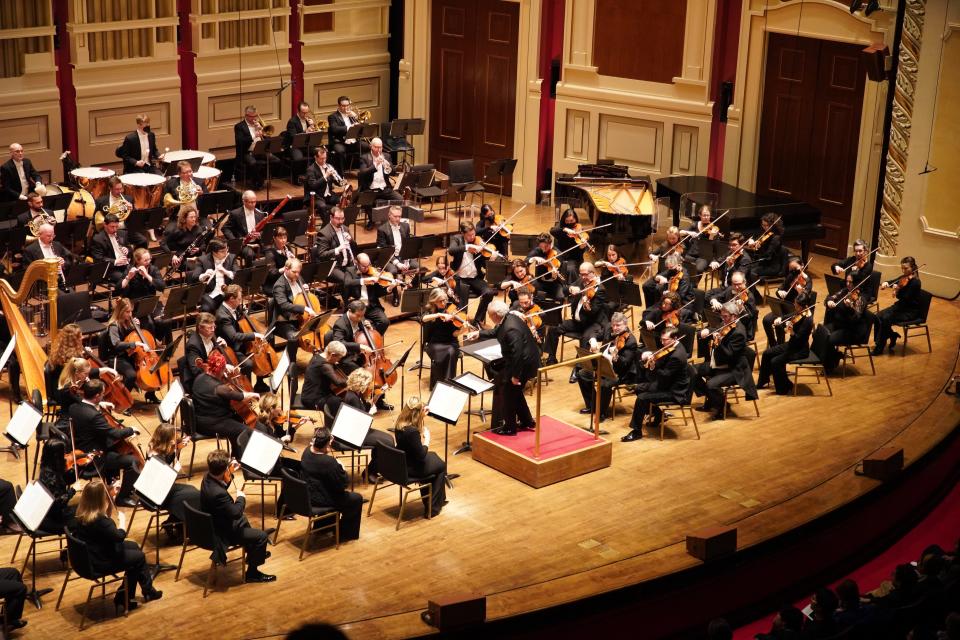F. Murray Abraham gets us pumped for his Pittsburgh Symphony appearance & Mozart requiem
PITTSBURGH – Death gets an entertaining and hopeful spin in “Requiem: Mozart’s Death in Words and Music” presented March 17-19 by the Pittsburgh Symphony Orchestra.
Throughout the Heinz Hall program, Academy Award-winning actor F. Murray Abraham will give several readings: starting by reciting a 1787 letter dealing with death, written by legendary composer Wolfgang Amadeus Mozart to his father.
Abraham, who won his Oscar portraying Mozart's rival Antonio Salieri in 1984's "Amadeus," also will read poignant poems by Nobel Prize-winning Jewish poet Nelly Sachs, then lend his commanding voice to passages from the Bible's Book of Revelation.
The musical presentation features Pittsburgh Symphony maestro Manfred Honeck leading the Grammy Award-winning orchestra through his contemporized take on Mozart’s epic masterpiece.
"I tell you, man, it's really thrilling to do this kind of thing," an enthusiastic Abraham, one of the stars of HBO's Golden Globe-winning "The White Lotus," said at the onset of a phone interview this past Friday from an unseasonably mild New York.
Abraham's passion for the symphony project was evident in his Q&A presented here:
Q: The program sounds intense. There's Austrian death bells, and Gregorian chants...
Abraham: It's great material. I did it at Carnegie Hall with them and it's a winner. It's super moving and very exciting. Hard to believe that people don't know that Mozart can be exciting, but it is.

Q: You're starting with Mozart's letter to his father dealing with mortality. What stands out to you about that letter?
Abraham: When you hear it, you'll understand that it's an upper. Because what he does is not so afraid of death. And that's a pretty good place to be, frankly. Because you know it's going to happen to all of us. And we go through it with loved ones when we lose them. It hurts. And you need some kind of consolation. People like to believe it's not the end. People believe there's something happening after that, and that helps them out I believe. I think that's what this guy is talking about.
Q: The Nelly Sachs poems you're reading, one uses a line, 'Love can accompany death;' why do you feel those are important for audiences to hear?
Abraham: You got to face the facts. It's a terrible thing. When you lose someone you love deeply, it's hard to take (Abraham's wife of 60 years, Kate Hannan, died of natural causes last November at the age of 82.) But you have to face up to it. Go through the mourning, and come out alive and well on the other side. And I think that's what this addresses. And sometimes people don't want to look at that because death is hard, you know? Of course it is, because you lose someone forever. But you got to come out, because life goes on. And I think that's what this talks about. There is a future. There's more. There's hope. And these days, God knows, the world could use a little hope.
Q: And you get to read from Revelation, we're talking 'I am the Alpha and the Omega territory here. How do you approach that? You already have this magnificent voice, but ...
A: Listen, man, it's just good material. I think people forget that the Bible ― they take it very reverently, like oh (makes voice go deeper) 'The Bible', oh ― (back to normal voice) but it's more than that. It's storytelling and it's exciting and I get a chance to do it. It's great literature. It's equal to Shakespeare certainly. But it's a privilege to say things like that. It's pretty outrageous stuff. It would be great if we could have some pictures to go with it. Well, we have great music to go with it.
Q: You've worked with a lot of symphonies since "Amadeus." What is it like from an actor's perspective to be on stage surrounded by world-class musicians?
A: I've done it all over the world and they let me sit right in the middle of the musicians and it's so exciting. The sound goes through you, like it shakes you. It's interesting. It's a privilege ― sorry ― many will never experience. It's like being in the middle of the ocean, swept along in the waves. I love it.
Q: We'll live it vicariously through you when you're on stage.
A: (Laughs) That's well said, man. Thanks.

Q: You're coming back to Pittsburgh. How does that feel emotionally returning to the city where you were born?
A: Oh yeah, I've been there a lot. I've done work there. I like Pittsburgh. We lived on The Hill. I don't know what they call it these days, do they still call it The Hill?
Q: Yes.
A: I was too young to remember much, but when I go back to visit I remember there's a couple really good places where I like to eat there. And there's good jazz. And I like jazz. I left when I was 4, but we used to go back every year because we had family there, and I have memories of it. I remember Kennywood Park. And is there still Isaly's ice cream?
Q: Yes there is.
A: Well, I'll be darned! (laughs).
Q: The Pittsburgh Symphony shared a video of you where you were on one of the late-night talk shows talking about your Oscar award and how you sometimes travel with it and bring it on stage. Any chance of that happening here?
A: Well, that's a secret, but yes I always do. It's appeared in every production I've ever done. And I think I'd like to do it. I hide it on stage so the audience can't see it, but it's just for the performers' sake.
Q: What did you like about taking on the role of Antonio Salieri in Amadeus?
A: It was a chance of a lifetime. It made my life a lot better. What can I tell you? An Oscar ... it's the best. That role was one everybody wanted. If it's possible to be immortalized on film, that's the film that will do it. I'm a very lucky man. Look, there's a lot of talent out there, and you've got to have a little luck to go along with the talent. And I'm very lucky.
Q: And for all of us fans of "The White Lotus," I've got to ask what did you enjoy most about playing Bert Di Grasso?
A: That was fun. Man, if you've never been to Sicily you got to put in on your calendar. I just love those people. I love Italy and know it very well but Sicily is something else. They don't call themselves Italians, did you know that? They call themselves Sicilians. It was kind of a different language. We had to have an intepreter for the crew; they insist on speaking their own Sicilian dialect. Very proud and warm people. And it was so pretty. Just what you saw. They didn't have to dress up the set. That's what Sicily looks like. And it's a little pricey, by the way.
Q: You brought a touching humanity to Bert. I felt for him.
A: I appreciate that. He meant a lot to me. He's from a different time. I think he's a good guy, even though he says some of the things he says. The most interesting thing about the reaction from the public to Bert is that women ― and you know how he treats women ― well, women responded to him. Women would stop me in the streets and say, 'I loved him ... I loved what you did.' He's a male chauvinist pig and they still said, 'Oh I love him so much.' Go figure that.
Q: Maybe that was because of his confidence?
A: I think they really knew he was a nice man.
Q: As an actor you've done so many amazing things, but can I ask if it was true you were the Leaf in the Fruit of the Loom underwear commercials?
A: Absolutely. I was pretty good, too. (Laughs). I had a good time. I did a lot of commercials in the old days. When I was just coming through, like 90 percent of the commercials were done in New York. We were fortunate. It paid the rent.
---
Tickets for the "In Words and Music: Honeck Conducts Mozart’s Requiem" show are at pittsburghsymphony.org. Showtimes are 8 p.m. Friday and Saturday and 2:30 p.m. Sunday.
Scott Tady is entertainment editor at The Times and easy to reach at stady@timesonline.com.
This article originally appeared on Beaver County Times: F. Murray Abraham says why Pittsburgh Symphony appearance is special

